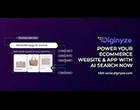
Profitable B2B companies often share a common trait: they understand the B2B procurement process and leverage digital technologies to enhance it. The risk of losing customers is high if your online presence doesn't differentiate you from your competitors (think Amazon). Regardless of the scope and variation of the B2B commercial landscape, a digital commerce system or marketplace management solution can deliver impressive results. Still, to offer an optimal customer experience and streamline business interactions, you need an eCommerce platform tailored to the unique needs of B2B transactions.
Understanding B2B eCommerce Platforms
B2B eCommerce platforms are specialized solutions that enable businesses to establish an online storefront and sell their goods and services to other businesses. Several advantages come with utilizing a B2B eCommerce platform.
A standout benefit is the opportunity for businesses to extend their reach beyond geographic limitations. An online store allows B2B businesses to market their products/services to customers globally, a significant edge over traditional brick-and-mortar stores restricted by location.
Moreover, B2B eCommerce platforms empower businesses to operate around the clock with unparalleled omnichannel commerce capabilities. The never-closing nature of an online store enables customers to make purchases at their convenience, unlike conventional stores with defined operating hours.
Additionally, B2B eCommerce platforms equip businesses with a suite of eCommerce marketing and promotional tools. For instance, businesses can apply search engine optimization (SEO) strategies to secure high placements on search engine results pages (SERPs) or use social media to amplify their store and product visibility.
Next, B2B eCommerce platforms provide eCommerce analytics and data tracking capabilities. Businesses can leverage these insights to enhance their store, refine their product offering, and improve the customer experience.

Top 10 B2B eCommerce Features
Let's delve into the essential elements of marketplace websites and B2B eCommerce features that can amplify customer satisfaction and boost sales performance.
1) Roles, Access Controls, and Permissions
B2B eCommerce platforms often serve a diverse range of user profiles with different job roles and responsibilities. Ensuring users have access to only the necessary data to fulfill their tasks is vital. An administrative user usually has the authority to add additional users and assign permissions to specific roles, including paying customers and unauthorized users.
Implementing access restrictions becomes crucial when your B2B business caters to a diverse clientele. Diginyze, for example, allows your employees, vendors, and customers to tailor unique experiences. it allows you to connect all front and back-office operations from a unified hub. As you introduce more back-office staff, customers, and visitors (non-authenticated buyers), managing and adjusting their rights becomes effortless with Diginyze B2B eCommerce platform.
2) Managing Corporate Accounts
In comparison to B2C, the B2B eCommerce user experience demands a higher level of personalization. For instance, corporate accounts often involve multiple users with varying roles and purchasing privileges when interacting with different departments or sub-units within a corporation.
Your system's corporate account management feature should be capable of handling complex, hierarchical corporate account structures. Regardless of the number of companies, teams, departments, offices, or branches they may have, buyers should be able to construct their account management structure, add authorized users, and establish purchase rules.
Understanding these intricate yet essential aspects of a B2B eCommerce platform can drive your business growth, enhancing user experience and improving overall business efficiency. B2B transactions often involve intricate buying procedures and approval processes. Consequently, your B2B eCommerce platform should be equipped with custom workflows, enabling different users to complete their tasks based on their respective roles and permissions. These workflows should cater to each unique business model, offering adequate flexibility to model any business process, such as multi-level order approval, quote negotiation, and return management.
With Diginyze, you can construct a multitude of workflows tailored to your specific requirements. Workflow automation can represent a sequence of tasks and transitions, ensuring all business processes run smoothly. What's more, these workflows can be edited or extended, allowing you to adjust the process as your business needs evolve.
3) Comprehensive Customer Support
An eCommerce platform should provide comprehensive customer support services to its users. This includes self-service options like Frequently Asked Questions (FAQs), troubleshooting guides, and instructional videos, as well as live support through chat or phone calls.
For example, Diginyze offers a host of support services that ensure customers have the best experience using the platform. The resources include detailed product documentation, FAQs section, blogs, a community forum for user discussions, and a dedicated customer support team available round the clock for any urgent issues.
You will need technical support during the implementation phase and continuous service post-implementation to ensure that your platform always runs smoothly. Thus, look for a B2B eCommerce platform that offers 24/7 support and has a reputation for excellent customer service and case studies.

Read also: How AI-Powered Automation is revolutionizing is eCommerce?
4) Advanced AI/ML Capabilities
The platform should offer advanced AI and automation capabilities to help you offer hyper-personalized customer experiences and make smart business decisions. An AI-powered eCommerce platform should help you Understand customers' buying patterns and suggest products through AI-powered smart search, should offer personalization, smart marketing, intelligent fraud prevention, automate catalog/inventory management, help deploy intelligent eCommerce chatbots, . Keep customers updated on new arrivals and deals with automated emails and messages.
Read also: See How AI-Powered Conversational Commerce is Transforming the Online Shopping Experience
5) Platform Credibility
It is crucial to assess the platform’s credibility. Have they worked with similar businesses before? Do they understand your business model and the unique challenges that your company faces? Their previous experience will give them a better understanding of your needs and enable them to deliver a solution that fits your business perfectly.
6) Solution Scalability
Can the eCommerce platform scale as your business grows? The best solutions are those that can support your business not just today, but in the future as well. Ensure that the solution can handle your projected growth and can be easily expanded to support new features and functionality as your business evolves.
Read also: How Automation is revolutionizing eCommerce?
7) Integration Capabilities
Your eCommerce platform should integrate seamlessly with your existing systems, such as your CRM, ERP, accounting software, and others. The platform should provide easy-to-use APIs, integrators or eCommerce connectors to connect data and processes from all front and back-office operations on a unified eCommerce platform.

8) Customizability
Every business has unique needs and your eCommerce solution should be flexible enough to accommodate them. The platform should allow you to customize the user interface, workflows, and features to fit your specific business processes.
9) Cost
Finally, you need to consider the cost of the solution. This includes not only the upfront costs, but also the ongoing costs for maintenance, support, and upgrades. Make sure that the solution fits within your budget and provides flexible eCommerce pricing plans a good return on investment.
10) Security
This is paramount for any eCommerce platform. The platform should be able to provide robust eCommerce security including data and server security, cloud and network security, data encryption and compliance with industry standards such as PCI DSS.
Takeaway:
In this evolving digital landscape, implementing a B2B eCommerce platform with the features highlighted above is crucial. It allows you to keep up with evolving customer expectations and dynamics, offers a seamless shopping experience, and ensures you remain competitive in your industry. Regardless of whether you're revamping your current website or launching a new one, focusing on these critical B2B commerce platform features will help you propel your business forward.
Need help choosing the right B2B eCommerce platform for your business? Get in touch with our eCommerce expert today.
Recent Blogs
Explore latest insights and trends in technology and eCommerce.
Case Studies
Your Digital Transformation Starts Here!
Join thousands of businesses transforming with Diginyze. Sign up today and start now!


























